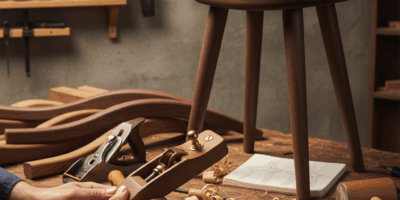As someone who’s spent over fifteen years working in wood shops of all sizes, I learned everything there is to know about the tools that actually matter. Today, I will share it all with you. Because honestly, walking into a fully equipped wood workshop can be overwhelming if nobody’s explained what everything does.
Saws — The Heart of Any Shop
Workshop tools has gotten complicated with all the specialized options flying around, but saws remain the cornerstone. Every shop has several types, each with a specific purpose:
- Table Saw: The workhorse. A circular blade mounted on an arbor, driven by an electric motor. Makes straight rip cuts and crosscuts. If a shop only has one power tool, it’s probably this.
- Band Saw: Perfect for curved cuts and resawing thick lumber into thinner boards. The continuous blade loop gives you control you can’t get with other saws.
- Miter Saw: For accurate crosscuts and angled cuts. Trim carpenters basically live behind these things.
- Jigsaw: When you need to cut an arbitrary curve or a complex shape. Not the most precise tool, but incredibly versatile for what it does.
Chisels — Where Detail Work Happens
These are hand tools with a shaped cutting edge for carving and shaping wood. You use them for cleaning out joints, chopping mortises, and doing detail work that power tools can’t handle. A good set of chisels, kept sharp, will outlast everything else in your shop. I’ve got a set from my grandfather that still works beautifully.
Planes — Precision Shaping
Wood planes shave off thin layers to adjust thickness and smooth surfaces. The bench plane handles big flattening jobs. Block planes trim end grain and fit parts. Smoothing planes give you that final glass-like surface. There’s something satisfying about a thin, curling shaving coming off a well-tuned plane that no sander can match.
Routers — Versatility in a Box
A router hollows out areas in a workpiece. That sounds simple, but the reality is routers can cut grooves, create joints, shape decorative edges, and about a hundred other things depending on which bit you chuck in. Probably should have led with this section, honestly — routers might be the most versatile power tool in the shop.
Drills — Holes Where You Need Them
From hand drills to cordless drivers to drill presses, these bore holes in wood. Different bits give you different hole sizes and types. A drill press gives you precision and repeatability that handheld drills just can’t match for certain jobs.
Sanders — Making Surfaces Smooth
Belt sanders remove material fast. Random orbital sanders give you smooth finishes without swirl marks. Disc sanders handle curved surfaces. Nobody loves sanding, but everyone loves what sanded wood looks like when the finish goes on.
Clamps and Vises — Your Extra Hands
These hold wood securely while you work on it. Bar clamps, C-clamps, bench vises — every woodworker I know says the same thing: you never have enough. Buy twice as many as you think you need.
Measuring and Marking Tools
Rulers, tapes, squares, marking gauges, compasses. Accurate measurement is where good work starts. A combination square is probably the tool I reach for most in any given day. That’s what makes precision endearing to us woodworkers — the satisfaction of parts fitting together perfectly because you measured carefully.
The Workbench
Not a tool in the traditional sense, but absolutely central to everything. A sturdy workbench with vises and dog holes is the platform where everything else happens. Skimp on other things if you must, but build or buy a solid bench.
Safety Equipment
Safety glasses, ear protection, dust masks or respirators. These aren’t optional. I’ve seen too many shop injuries that proper safety gear would have prevented. Protect your eyes, your ears, and your lungs. Everything else in the shop is replaceable — you aren’t.


Leave a Reply